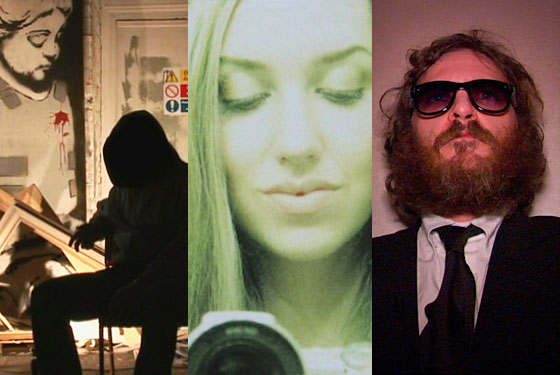
With Casey AffleckÔÇÖs Joaquin PhoenixÔÇôbecomes-a-rapper doc IÔÇÖm Still Here making its highly anticipated debut this week, the surprise hit Exit Through the Gift Shop still in theaters, and the below-the-radar Sundance phenomenon Catfish on deck for release next week, it seems that 2010 may be remembered for what weÔÇÖll call The Questionable Documentary ÔÇö documentaries that, though they purport to be true, provoke a remarkable amount of skepticism from audiences. (Jeanette Catsoulis of the Times dubbed the genre ÔÇ£prankumentary,ÔÇØ but we feel like that falls a bit too squarely on one side of the debate.) Whether the skepticism is warranted or not remains to be seen; in fact, it may never be clarified. But in some weird way ÔÇö intentional or not ÔÇö the uncertainty is also what makes these films so exciting.
It used to be that the documentary form by its very nature denoted a kind of absolute truth. The great British filmmaker Peter WatkinsÔÇÖs The War Game, a fictional depiction of a nuclear attack on Britain filmed like a news program, actually won the Best Documentary Oscar in 1966 ÔÇö even though Oscar voters presumably knew that Britain had not been nuked by the Soviets. And obviously, thereÔÇÖs the example of Orson WellesÔÇÖs War of the Worlds broadcast in 1938. In fact, Welles can take some additional credit for the questionable-doc genre thanks to his 1973 masterpiece F for Fake, which took an unfinished documentary about art forgery and turned it into a strange hybrid of fact and fiction. WellesÔÇÖs film starts off telling the truth, but only for about an hour. It famously ends with the director making a hilarious confession: ÔÇ£For the past seventeen minutes, IÔÇÖve been lying my head off.ÔÇØ
Over the years, such clear delineations between fact and fiction became a thing of the past. Staging certain things has always been a part of making documentaries (heck, even parts of Nanook of the North were staged), but some carried it too far. The Hangover director Todd Phillips found himself in a world of trouble in 1998, when HBO purchased his documentary Frat House, only to discover that some of its scenes of egregious fraternity behavior had been done for the cameras. Needless to say, Phillips has done okay for himself (not coincidentally, he became HollywoodÔÇÖs go-to guy for frat-house comedies), but HBO refused to show the film.
Maybe now they could, because our increased skepticism as an audience, strangely, makes these films more exciting. The doubt that greeted Joaquin PhoenixÔÇÖs admittedly wacky announcement that he would abandon acting for a career in hip-hop reached a fever pitch when word came out that Affleck would be following his friend (and brother-in-law) around with a camera. Sure, plenty of people rained scorn on Phoenix: Go to any message board and youÔÇÖll see that people think heÔÇÖs either a fake, an idiot, or crazy (or all three). But that just makes everyone that much more excited about the film. And it seems fair to say that IÔÇÖm Still Here wonÔÇÖt really answer the question of whether PhoenixÔÇÖs gambit is a hoax; it will just provide more evidence for both sides of the debate. It dares to leave the question of its sincerity open. If Joaquin Phoenix merely decided to become a rapper and flamed out miserably, the story would have been over in a fortnight. Instead, our uncertainty has kept us fascinated.
That may also be why Exit Through the Gift Shop is still showing theatrically, since its April debut. Yes, itÔÇÖs a good movie, but even good movies rarely play that long. Something else is going on here. Ostensibly a documentary by the mysterious street artist Banksy about his relationship with a French immigrant art buff named Thierry Guetta, who managed to reinvent himself as a Los Angeles art-world phenomenon named Mr. Brainwash, the film has provoked debate about whether Mr. Brainwash himself is a Banksy creation. Exit is certainly saying something about the fickle and craven nature of the art world; the uncertainty over BrainwashÔÇÖs origins merely enhances the theme, and keeps us thinking about it. Indeed, itÔÇÖs a bit like that spinning top at the end of Inception: Sure, we want to know if the whole thing is a dream, but weÔÇÖre more fascinated by the fact that we donÔÇÖt know, and probably never will.


